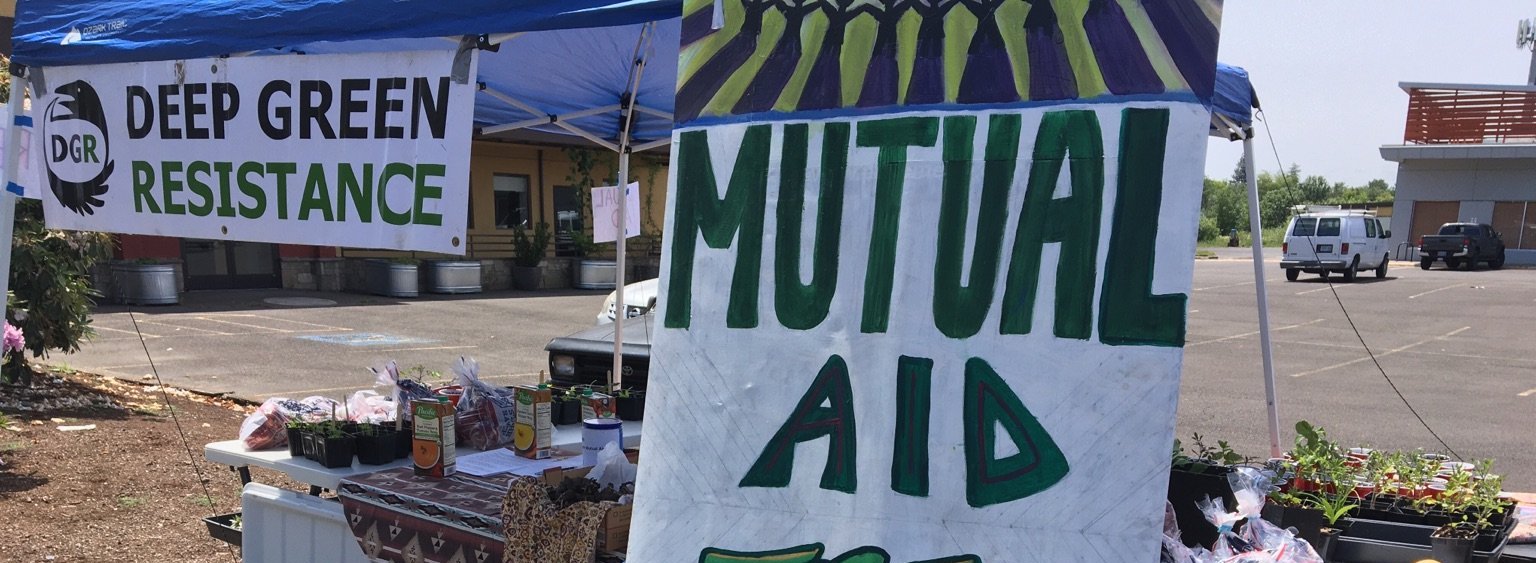This is the text of a handout being distributed at ongoing DGR solidarity and mutual aid actions.
We can’t depend on the government or corporations to provide for our communities.
That’s why Deep Green Resistance, in coordination with our allies is responding with community MUTUAL AID. We are building local food systems and autonomy by distributing food and other basic necessities, seeds, small livestock, cooking and gardening supplies, native tree seedlings (98% of old growth forest in the U.S. has been destroyed), first-aid resources, and self-sufficiency education to people in the community.
Why Mutual Aid?
As the recent crisis show, modern industrial civilization is fragile. Globalized supply chains are highly vulnerable to global disruptions. And capitalism has systematically destroyed alternatives. Most of us don’t own land, so we must buy what we need to survive.
More of these shocks are coming, as industrial civilization destroys the ecological foundations of life. Soil and water depletion, deforestation, ocean acidification, the rise of dead zones, and overfishing are just a few of the trends.
We are seeing cracks in the industrial food system, which is leading people to question modernity. This is a good thing. It’s essential that we begin a wholesale shift away from high-energy, consumeristic lifestyles and towards local, small-scale, low-energy ways of life. We need to abandon industrial capitalism before it destroys all life on the planet.
“There is no sovereignty without food sovereignty.” — John Mohawk
What is Your Political Platform?
Deep Green Resistance is a revolutionary organization. We are opposed to racism, sexism, and colonization, and in our analysis industrial civilization is destroying the ecology of this planet. We advocate, agitate, and organize to dismantle industrial civilization and replace it with localized, sustainable human communities.
Not only do we need to re-localize our food systems, we also need community defense and resistance movements dedicated to pro-actively dismantling industrial civilization in solidarity with colonized peoples and indigenous communities. We can’t just grow nice gardens. We have to get organized, fight like hell against the ruling class, and bring a revolutionary edge to all of our organizing. We have to combine building the new with dismantling the old.
The failure of mainstream political parties of technological solutions are becoming increasingly clear to average people. They are looking for solutions. Popular movements are becoming increasingly confrontational. But still, it is rare that anyone is able to articulate a feasible alternative to the dominant culture, the techno-industrial economic system.
A political resistance movement has this alternative. By coordinating allies and simultaneously working to rapidly re-localize and de-industrialize human populations, we provide a feasible alternative to partisan gridlock and demonstrate a tangible real-world alternative. This movement needs to begin at the local and regional levels, seizing power in schools, county offices, water and soil boards, and building our own power structures through localized food networks, housing, labor, and political organizing.
How Can I Get Involved?
Mutual aid must be mutual. We are looking to build and strengthen long-lasting relationships of trust and solidarity, and find new allies. Community building is a key goal for us in this effort. We will continue to organize mutual aid efforts, pressure governments to allocate land for community garden, and take direct action.
We hope to see this project replicated around the world. We take inspiration from the many people already engaged in this sort of work, especially combining ecological awareness, practical re-localization, and revolutionary resistance. Contact us for more information, to get involved, or to talk about implementing similar projects in your community.
- contact@deepgreenresistance.org
- +1 (206) 395-6251
- @deepgreenresistance (Wire app)
Resources
- https://retrosuburbia.com/ — an online book on how to be self-sufficient.
- https://selfsufficientme.com — videos and information on home food production.
- Charles Dowding provides many videos on getting started on vegetable growing.
- There are plenty of good-quality videos on YouTube to help you start a vegetable garden, keep chickens, design a food forest, establish urban farming, and make compost.
- https://www.milkwood.net/ —resources on growing, foraging and community care.
- To prep for power outages, build a simple, cheap rocket stove to cook on (YouTube).
- Look into local community gardens, permaculture and organic growing groups, and neighborhood centers for information that is relevant to your neighborhood.
* We have chosen to distribute native oak seedlings because native oak savanna is the most endangered habitat in the country. More than 95% of it has been destroyed since colonization. Second, because acorns can be a valuable staple food. Third, because planting native oak trees (and assisting in the northward migration of valuable non-native food trees) can help begin the transition to perennial food systems while both mitigating and preparing for global warming and biodiversity collapses (oaks are prized by wildlife and oak savanna is an extremely biodiverse habitat).

